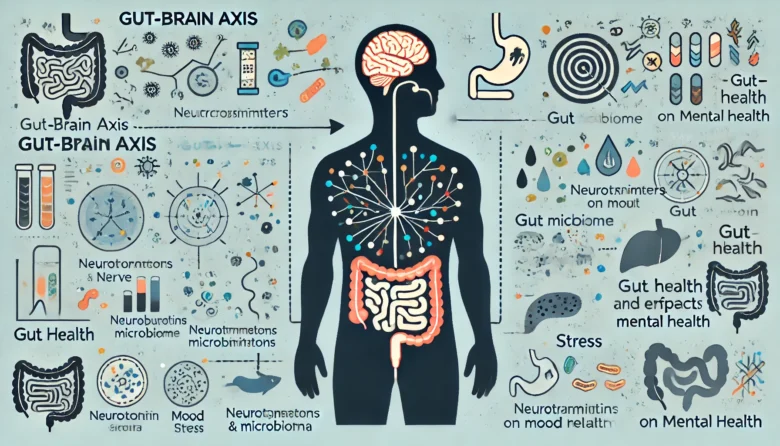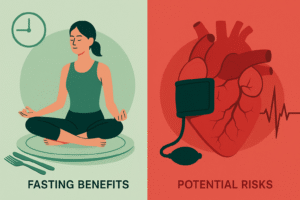When we think about our health, we often focus on things like exercise, diet, or regular check-ups. But did you know that one of the most important factors affecting your overall health is actually inside your gut? The “Role of Gut Microbiota in Human Health” is a fascinating and emerging field of study. These tiny microorganisms, which include bacteria, fungi, and viruses, play an essential role in everything from digestion to mental well-being. In this blog, we’ll explore how the microbiota in your gut can influence your health in surprising ways.
What is Gut Microbiota?
First, let’s break down what gut microbiota actually refers to. The human gut is home to trillions of microorganisms, collectively known as the gut microbiota. These microbes live in a symbiotic relationship with our bodies, meaning they help us, and we help them thrive. You might not realize it, but your gut is an ecosystem of bacteria, and keeping that ecosystem healthy can have far-reaching effects on your overall well-being.
The majority of these microbes are beneficial. They aid in digesting food, breaking down complex carbohydrates, producing vitamins, and even protecting us from harmful pathogens. However, the balance of “good” and “bad” bacteria can shift due to factors like diet, antibiotics, or illness, affecting our health in various ways.
Digestion and Nutrient Absorption
One of the most well-known roles of gut microbiota is its impact on digestion. Certain fibres and nutrients that we consume cannot be broken down by our body’s enzymes alone. This is where gut bacteria come in. These microbes help digest complex carbohydrates, like the fibre in fruits and vegetables, and convert them into short-chain fatty acids, which are important for gut health.
A well-balanced gut microbiome supports efficient digestion, and when it’s disrupted, problems can arise. For example, people with Irritable Bowel Syndrome (IBS) often have an imbalance in their gut microbiota, leading to bloating, gas, and discomfort.

Immune System Support
Believe it or not, your gut microbiota is a major player in your immune system. Around 70% of the immune system is located in the gut and the microbes there help regulate immune responses. They act as a barrier to harmful bacteria and viruses, stimulating immune cells to fight infections and inflammation.
A healthy gut microbiome can prevent autoimmune diseases, allergies, and chronic inflammation. Research has shown that children who grow up in environments with greater microbial exposure—like on farms—have a lower risk of developing allergies or asthma, thanks to a more diverse microbiome.
Mental Health and the Gut-Brain Axis
One of the most exciting discoveries in recent years is the connection between gut microbiota and mental health, often referred to as the gut-brain axis. The gut and brain communicate through the vagus nerve, a long nerve that runs from the gut to the brain, as well as through chemical messengers like serotonin.
Interestingly, 90% of the body’s serotonin (a neurotransmitter responsible for mood regulation) is produced in the gut. Disruptions in gut bacteria have been associated with mental health conditions such as anxiety and depression. Case studies show that people who suffer from depression often have lower diversity in their gut microbiota. This research suggests that improving gut health could be a new approach to managing mental health.
A well-known anecdote comes from a 2017 study where patients with depression saw significant improvement in their symptoms after receiving probiotics—live bacteria that promote a healthy gut. These findings open up new possibilities for treating mental health through diet and probiotics rather than relying solely on traditional medication.
The Role of Antibiotics and Diet
Antibiotics, while life-saving, can also disrupt the gut microbiome by killing off both harmful and beneficial bacteria. A single course of antibiotics can alter the microbiota for months or even longer. This is why doctors often recommend probiotics to restore balance after antibiotic treatment.
Your diet plays a crucial role in the health of your gut microbiota as well. A diet rich in fibre, fruits, vegetables, and fermented foods (like yoghurt and kimchi) supports a diverse and healthy microbiome. On the flip side, diets high in sugar, processed foods, and unhealthy fats can promote the growth of harmful bacteria, leading to an imbalance.
Research suggests that diets like the Mediterranean diet, rich in plant-based foods and healthy fats, are linked to a more diverse gut microbiome, improved digestion, and enhanced overall health.
Case Study: The Impact of Gut Microbiota on Obesity
One of the most intriguing areas of research focuses on the link between gut microbiota and obesity. Research has shown that individuals with obesity generally possess a less varied gut microbiome compared to those with a healthy weight. In one famous study, scientists transferred gut bacteria from obese mice into healthy mice. The healthy mice began to gain weight without changing their diet, illustrating just how powerful the microbiome can be in regulating metabolism and body weight.
This has opened new discussions about how gut health could be the key to weight management. Diet, exercise, and gut microbiota-targeted therapies, like prebiotics (food for beneficial bacteria) and probiotics, may all work together to maintain a healthy weight.
Future Directions: Gut Microbiota and Personalized Medicine
The study of gut microbiota is still in its early stages, but its potential for personalized medicine is enormous. In the future, we may be able to use a person’s unique microbiome to create customized treatments for everything from diabetes to heart disease. Companies like Viome and DayTwo, which analyze gut microbiome samples to offer personalized diet and lifestyle recommendations, are already stepping into this space. Viome focuses on gut health through microbiome testing, while DayTwo provides personalized nutrition advice based on gut bacteria data to help manage blood sugar levels.
As researchers continue to explore the gut microbiota’s role in human health, we are likely to see new treatments for a wide range of conditions—some that might not have even been linked to gut health yet!
Conclusion
The role of gut microbiota in human health is undeniable. From digestion and immune support to mental health and weight management, these tiny microorganisms are crucial to maintaining a balanced, healthy life. Keeping your gut microbiome healthy through diet, avoiding unnecessary antibiotics, and incorporating probiotics and prebiotics into your routine can have long-lasting effects on your overall health.
As we learn more about the gut microbiome, one thing is clear: taking care of your gut is one of the best ways to take care of your entire body. So, the next time you reach for a snack or consider your health, remember that the trillions of microbes inside you play a huge role in how you feel every day.
Author’s Note
I’ve always been fascinated by the idea that so much of our health starts in the gut. Understanding the role of gut microbiota has completely changed the way I think about diet and overall wellness. I hope this blog encourages you to pay more attention to the incredible ecosystem living inside you!
G.C., Ecosociosphere contributor.
References and Further Reading
- Gut Microbiota and Human Health – Harvard T.H. Chan School of Public Health
- The Role of Gut Microbiota in Health and Disease – National Institutes of Health
- Yang, M., Zheng, J., Zong, X., Yang, X., Zhang, Y., Man, C., & Jiang, Y. (2021). Preventive Effect and Molecular Mechanism of <i>Lactobacillus rhamnosus</i> JL1 on Food-Borne Obesity in Mice. Nutrients, 13(11), 3989.
- Gut Health | Fresh Cardio. https://freshcardio.com/tag/gut-health/
- Gut Health: The Cornerstone of Nutrient Absorption. https://equalityanddemocracy.org/gut-health-the-cornerstone-of-nutrient-absorption
- Caplan, E. (2018). Integrative review of the effect of gluten, if any, on gastrointestinal symptoms in non-celiac disease patients. https://core.ac.uk/download/163106498.doc
- Allergies add extra challenges. https://hoards.com/blog-18478-allergies-add-extra-challenges.html
- Personalized Nutrition For Mental Wellness – APEX Professional Solutions, LLC. https://theapexpros.com/personalized-nutrition-for-mental-wellness/
- Sebastian Siebert Supplements Blog – Tagged “Leaky Gut”. https://www.sebastiansiebertsupplements.com/blogs/news/tagged/leaky-gut
- 6 Ways Mushrooms Can Impact Sustainability and Human Health – My Blog. https://psychomedics.org/6-ways-mushrooms-can-impact-sustainability-and-human-health/
- How Your Diet Affects Your Heart and How Cardiologists Can Help – Distinct Health First. https://distincthealthfirst.com/how-your-diet-affects-your-heart-and-how-cardiologists-can-help/
- The Connection Between Gut Health and Mental Health – Montana Functional Health. https://mfhcare.com/article/the-connection-between-gut-health-and-mental-health/
- Low GI for gut health | GI Foundation. https://www.gisymbol.com/low-gi-for-gut-health/
- Yang, M., Zheng, J., Zong, X., Yang, X., Zhang, Y., Man, C., & Jiang, Y. (2021). Preventive Effect and Molecular Mechanism of <i>Lactobacillus rhamnosus</i> JL1 on Food-Borne Obesity in Mice. Nutrients, 13(11), 3989.




